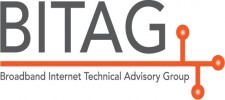BITAG Publishes Report: Internet of Things (IoT) Security and Privacy Recommendations

Denver, CO, November 22, 2016 (Newswire.com) - Today, the Broadband Internet Technical Advisory Group (BITAG) announced the publication of its report on the technical aspects of Internet of Things (IoT) security and privacy. The report itself can be found at http://www.bitag.org/report-internet-of-things-security-privacy-recommendations.php.
In the past few years, many devices now connecting to the Internet are not only personal computers but also a variety of devices embedded with Internet connectivity and functions. This class of devices has generally been described as the Internet of Things (IoT) and has brought with it new security and privacy risks.
Although consumers face general security and privacy threats as a result of any Internet-connected device, the nature of consumer IoT is unique because it can involve non-technical or uninterested consumers; challenging device discovery and inventory on consumer home networks as the number and variety of devices proliferate; negative effects on the Internet access service of both the consumer and others that run on shared network links; and effects on other Internet services when these devices are compromised by malware and become a platform for unwanted data traffic — such as spam and denial of service attacks — which can interfere with the provision of these other services. Importantly, the number and diversity of consumer IoT devices is growing rapidly, and these devices often function autonomously, without human intervention.
Several recent incidents have demonstrated that some devices do not abide by rudimentary privacy and security best practices. In some cases, devices have been compromised and allowed unauthorized users to perform Distributed Denial of Service (DDoS) attacks, perform surveillance and monitoring, gain unauthorized access or control, induce device or system failures, and disturb or harass authorized users or device owners.
Potential issues contributing to the lack of privacy and security best practices include: lack of IoT supply chain experience with security and privacy, lack of incentives to develop and deploy updates after the initial sale, lack of secure over-the-network software updates, devices with malware inserted during the manufacturing process, and more.
The emergence of IoT presents opportunities for significant innovation, from smart homes to smart cities. In many cases, straightforward changes to device development, distribution, and maintenance processes can prevent the distribution of IoT devices that suffer from significant security and privacy issues. BITAG believes the recommendations outlined in this report may help to dramatically improve the security and privacy of IoT devices and minimize the costs associated with collateral damage. In addition, unless the IoT device sector — the sector of the industry that manufactures and distributes these devices — improves device security and privacy, consumer backlash may impede the growth of the IoT marketplace and ultimately limit the promise that IoT holds.
The lead editors of BITAG’s report on the Internet of Things (IoT) Security and Privacy Recommendations were Jason Livingood, Vice President - Technology Policy & Standards at Comcast and Nick Feamster, Professor of Computer Science at Princeton University. Douglas Sicker, Executive Director of BITAG, Chair of BITAG’s Technical Working Group, Department Head of Engineering and Public Policy and a Professor of Computer Science at Carnegie Mellon University, chaired the review itself.
About BITAG
BITAG is a non-profit, multi-stakeholder organization focused on bringing together engineers and technologists in a Technical Working Group (TWG) to develop consensus on broadband network management practices and other related technical issues that can affect users’ Internet experience, including the impact to and from applications, content and devices that utilize the Internet.
This is BITAG’s ninth technical report. BITAG’s recent reports have focused on: differentiation of Internet traffic, Internet interconnection, real-time network management of Internet congestion, and port blocking, among other topics. Copies of these technical reports can be found on the BITAG website at www.bitag.org.
Questions, Suggestions or Topics? BITAG welcomes any questions, comments or suggestions. Also, if you are interested in submitting a technical review request to BITAG, please contact our Deputy Director, Kaleb Sieh, at ksieh@bitag.org.
Source: Broadband Internet Technical Advisory Group (BITAG)